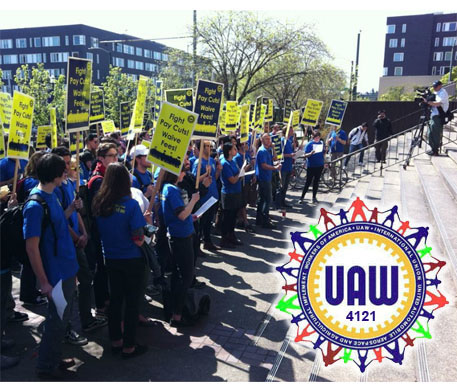OPINION
UW’s proposed wage cuts are unfair, unequal, and inequitable
By DOUGLAS CASTRO
(May 31, 2018) — There are few things more insidious than couching oppression in the language of “fairness,” “community,” “equality,” and “equity.”
I am not a “traditional” graduate student. Like many other Latinx (and African-American) students from working-class backgrounds, I decided to pursue a post-baccalaureate degree at the University of Washington not just because I thought it could help me make a difference in my community, but also because I need economic security for me and my children. Reflected throughout the nationwide teacher strikes, educators with Bachelor’s degrees are struggling to make ends meet. They are overworked and underpaid. A standard college education can no longer guarantee economic security, especially for graduate students from historically marginalized groups and even more so those with dependent children.

Students like me rely on TA/RAships to pay for schooling and to adequately take care of our families while obtaining our degrees. Without these positions, we — and our families — fall through the cracks.
What is UW administration’s response to the presence of working-class students –especially those from historically marginalized groups — in the academy? To students who work hard to secure both the present and the future for themselves, their families, and their communities? To students who want to contribute their expertise to future generations?
The response has been to prioritize and fully fund ever-expanding and superfluous administrative positions, then to turn around and propose wage cuts that they justify through a “commitment to fairness.”
When the UW proposes to reduce wages and not waive fees for ASEs relative to the sharply rising costs of living, the distribution of this hardship is not felt equally. While it is true that the vast majority of ASE’s are rent burdened, the impact of this rent burden is not the same for our non-traditional graduate students. How are our working-class students and student-parents supposed to sustain their education costs amidst rising costs of living? How many jobs do we have to work? How much debt must we amass? How many times do we have to skip dinner, so our kids can eat? How much more sleep must we lose from the long hours commuting, grading and preparing lessons for the multiple classes we teach on various campuses — in addition to conducting our own research and completing our course requirements? How can we effectively carry out UW’s mission to educate the future? Unfortunately, without a fair and equitable contract — one that recognizes not only rising costs of living, but also the differential impacts these costs have on our most vulnerable members — we cannot.
This year, throughout the negotiations with the academic student employees (ASEs) of UAW Local 4121, the administration at the University of Washington has claimed that their bargaining proposals — which involve significant wage cuts for our members relative to both skyrocketing rents and past wage increases from our collective bargaining agreement as well as the continuation of certain mandatory fees — are indicative of a “commitment to fairness.”
Let us remind UW administration that the ASE’s whose wages they propose to cut are diverse in many ways — most notably with respect to social class, race, gender, and immigrant statuses. Not all student employees pursue their education under the same conditions or for the same reasons. Not all members of the UW community of ASEs — myself included — are similarly affected by these rising costs and proposed cuts to our wages. For first-generation, under-represented, and/or historically marginalized groups, these wage cuts slam the door on our future. A “commitment to fairness” and equity with complete disregard for the diverse and unequal conditions students and workers face amounts to oppressive policy that directly undermines UW’s commitment to equity.
“Providing equity for all” is not accomplished merely through providing opportunities to historically marginalized groups, but by welcoming rather than resisting and refusing their attempts to provide themselves the means to benefit from those opportunities. Thus far, the UW administration has refused and rejected us. For this reason, we at UAW 4121 continue to work hard to correct this inequity through collective bargaining with the university administration, and when necessary, collective action.
Douglas Castro is a member of UAW Local 4121, the union of Academic Student Employees at the University of Washington.






